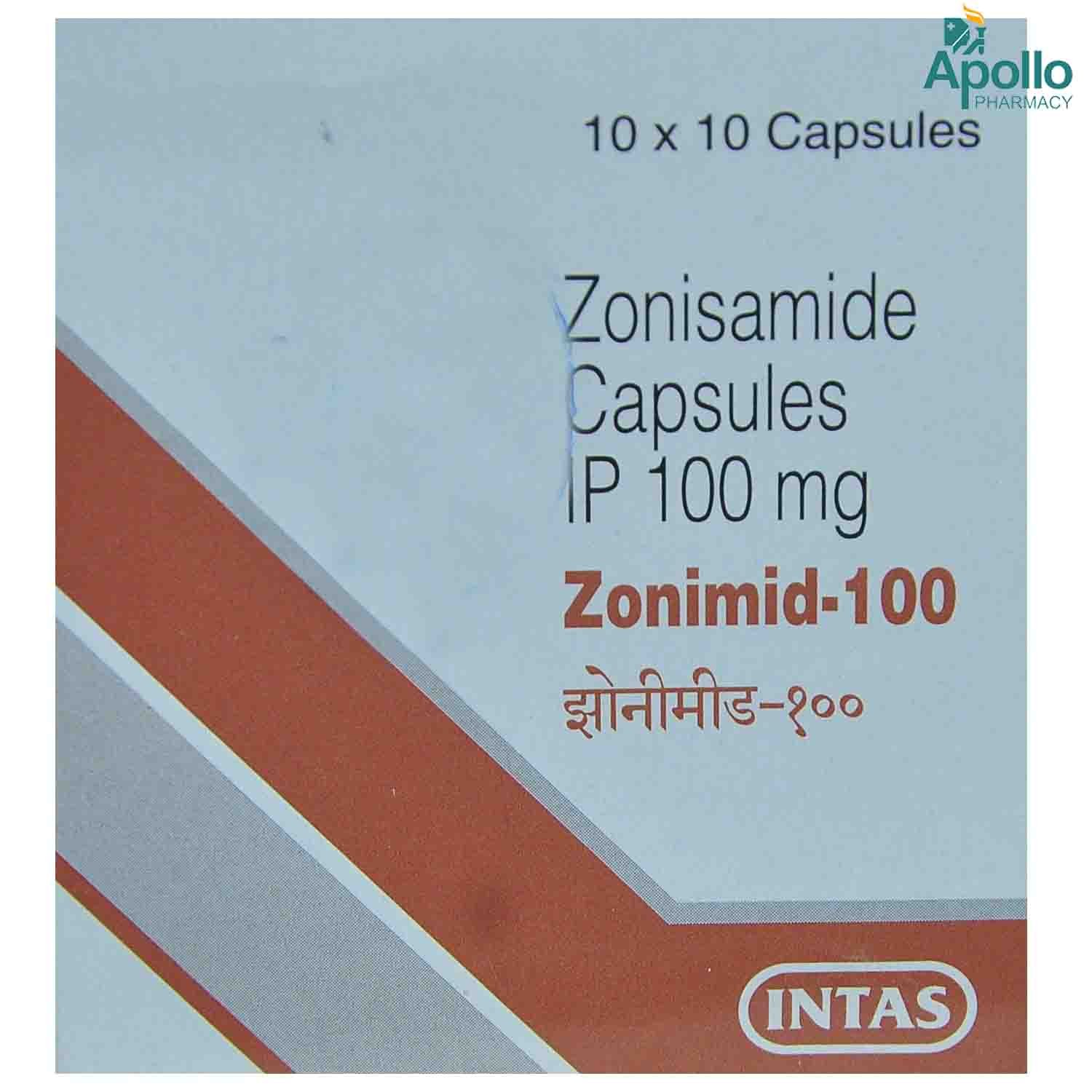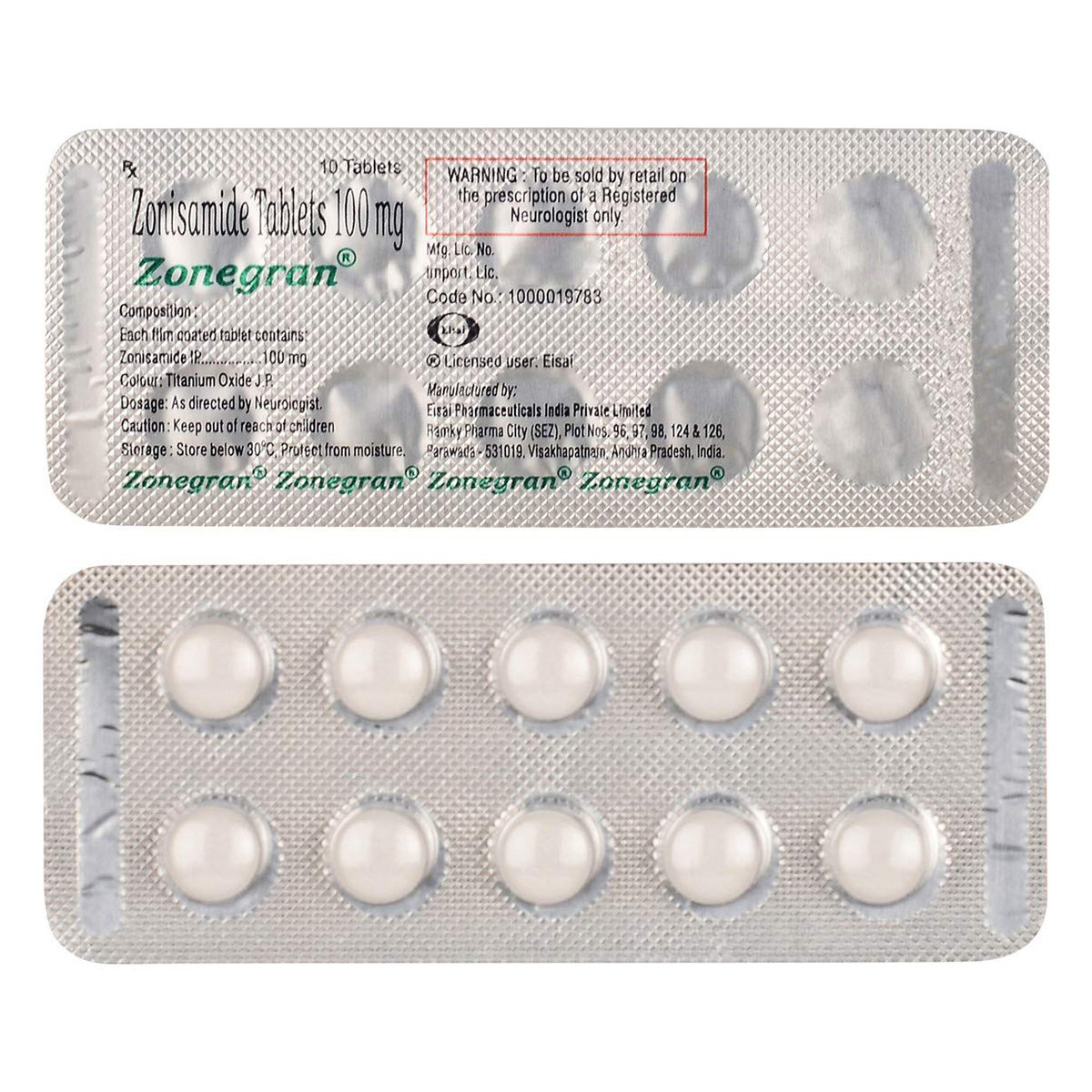Zonegram 100 mg Tablet 10's
MRP ₹262
(Inclusive of all Taxes)
₹39.3 Cashback (15%)
Provide Delivery Location
Online payment accepted
 Prescription drug
Prescription drugWhats That
Composition :
Manufacturer/Marketer :
Consume Type :
Expires on or after :
Return Policy :
About Zonegram 100 mg Tablet
Zonegram 100 mg Tablet belongs to a group of medicines called anti-convulsants or anti-epileptics used to treat epilepsy (seizures/fits). Epilepsy is a sudden rush of electricity in the brain. In epilepsy the brain's electrical rhythms become imbalanced, resulting in recurrent seizures. In patients with seizures, the typical brain electrical pattern is disrupted by sudden bursts of electrical impulses that affect an individual’s consciousness, movements, or sensations.
Zonegram 100 mg Tablet contains 'Zonisamide’ that reduces the abnormal and excessive activity of nerve impulses in the brain that cause fits or seizures. Thereby helps in controlling seizures. In patients with seizures, the typical brain electrical pattern is disrupted by sudden bursts of electrical impulses that affect an individual’s consciousness, movements, or sensations. Zonegram 100 mg Tablet is used alone or in combination to treat and prevent partial seizures in adults and children above 6 years of age.
Take Zonegram 100 mg Tablet as prescribed by your doctor. You are advised to take Zonegram 100 mg Tablet for as long as your doctor has prescribed it for you depending on your medical condition. In some cases, you may experience certain common side-effects such as dizziness, irritability, loss of appetite, memory impairment, double vision, confusion, depression, constipation, nausea, headache, uncontrolled movements. Most of these side-effects do not require medical attention and will resolve gradually over time. However, you are advised to talk to your doctor if you experience these side effects persistently.
To treat your condition effectually, continue taking Zonegram 100 mg Tablet for as long as your doctor has prescribed. Please do not stop taking Zonegram 100 mg Tablet without consulting your doctor to avoid worsening of seizures. Do not take Zonegram 100 mg Tablet if you are pregnant or planning for pregnancy unless prescribed by the doctor. Avoid taking Zonegram 100 mg Tablet while breastfeeding as it may cause side-effects in the breastfed babies. Zonegram 100 mg Tablet should not be given to children unless prescribed. Zonegram 100 mg Tablet causes drowsiness and dizziness, so drive if you are alert. Zonegram 100 mg Tablet should not be given to children unless prescribed. Avoid consuming alcohol along with Zonegram 100 mg Tablet as it could lead to increased dizziness and sleepiness. Consult your doctor immediately if you experience mood swings or suicidal tendencies. Zonegram 100 mg Tablet can cause permanent vision loss, inform your doctor immediately if you have any eye pain, redness, or any changes in your vision. Keep your doctor informed about your health condition and medicines to rule out any side effects.
Uses of Zonegram 100 mg Tablet
Directions for Use
Key Benefits
Zonegram 100 mg Tablet belongs to a group of medicines called anti-convulsants or anti-epileptics. Zonegram 100 mg Tablet is used to treat epilepsy/seizures/fits. Epilepsy is a sudden rush of electricity in the brain. Zonegram 100 mg Tablet works by blocking the sodium and calcium current in the brain and suppress the abnormal and excessive activity of nerve impulses in the brain that cause fits and pain. Thereby help in controlling seizures. Zonegram 100 mg Tablet is used alone or in combination to treat and prevent partial seizures and generalized seizures in adults. Zonegram 100 mg Tablet may be used as solo therapy or in combination in treating and preventing seizures in children above 6 years of age. Zonegram 100 mg Tablet is not associated with any psychological or physical dependence, and there is no potential for abuse.
Storage
Drug Warnings
Do not take Zonegram 100 mg Tablet if you are allergic to Zonisamide or any of its contents. Avoid intake of Zonegram 100 mg Tablet if you are pregnant or planning for pregnancy unless prescribed by the doctor. Breastfeeding mothers should consult the doctor before using Zonegram 100 mg Tablet to pass into the breast milk and affect the baby. Zonegram 100 mg Tablet should not be given to children unless prescribed. Inform your doctor before taking Zonegram 100 mg Tablet if you have or had kidney and liver problems, glaucoma, high levels of ammonia, osteoporosis, depression, heart problems if you have low levels of bicarbonate in blood you have previously suffered from kidney stones. Do not stop taking Zonegram 100 mg Tablet without consulting your doctor to avoid worsening of seizure episodes. Zonegram 100 mg Tablet causes drowsiness and dizziness, so drive only if you are alert. Avoid consuming alcohol along with Zonegram 100 mg Tablet as it could lead to increased dizziness and sleepiness. Consult your doctor immediately if you experience mood swings or suicidal tendencies. Zonegram 100 mg Tablet can cause permanent vision loss, inform your doctor immediately if you have any eye pain, redness, or any changes in your vision.
Diet & Lifestyle Advise
- A ketogenic diet (low in carbohydrates and high in fats) is recommended for children with epilepsy. This diet helps in utilizing fat instead of glucose for the generation of energy.
- Atkins diet (high fay and controlled carbohydrates) is recommended for adolescents and adults.
- Rest well, get plenty of sleep.
- Avoid smoking and alcohol consumption.
- Exercise, meditation, and yoga can help lower stress, decrease pain sensitivity, and improves coping skills.
- Prepare your living area; small changes may reduce the risk of physical injury during a seizure.
- Install an alarm or emergency device to get assistance during a seizure attack.
Side Effects of Zonegram 100 mg Tablet
- Dizziness
- drowsiness
- Irritability
- Loss of appetite
- Memory impairment
- Impaired coordination
- Double vision
- Confusion
- Kidney stones
- Diarrhoea
- Constipation
- Decreased blood levels of bicarbonates (a substance that prevents the blood from becoming acidic)
Habit Forming
Therapeutic Class
All Substitutes & Brand Comparisons
RX
ZONIMID 100MG TABLET
Intas Pharmaceuticals Ltd
₹194
(₹17.46 per unit)
25% CHEAPERRX
Zonegran Tablet 10's
Eisai Pharmaceuticals India Pvt Ltd
₹245.5
(₹22.1 per unit)
6% CHEAPER
Author Details
We provide you with authentic, trustworthy and relevant information
FAQs
Drug-Drug Interactions Checker List
- AMITRIPTYLINE
- DULOXETINE
- SERTRALINE
- FLUOXETINE
- GABAPENTIN
- LAMOTRIGINE
- PREGABALIN
- PHENYTOIN
- TOPIRAMATE
- ARIPIPRAZOLE
- QUETIAPINE
- LITHIUM
- ALPRAZOLAM
- ERYTHROMYCIN
- CLARITHROMYCIN
- TELITHROMYCIN
- CHLORPHENIRAMINE
- CODEINE
- OXYCODONE
- TRAMADOL
- MORPHINE
- DIPHENHYDRAMINE
- KETOCONAZOLE
- ITRACONAZOLE
- FLUCONAZOLE
- TRIAZOLAM
- TROLEANDOMYCIN
- BROMPHENIRAMINE
Special Advise
- Regular monitoring of bicarbonate levels while taking Zonegram 100 mg Tablet is advised to prevent low blood bicarbonate levels.
- Zonegram 100 mg Tablet may cause low blood cell count, so if you have any red or purple spots on the body, let your doctor know about this.
Disease/Condition Glossary
Epilepsy: Epilepsy is a sudden rush of electricity in the brain. It is a disorder of the nervous system which occurs due to disturbed nerve cell activity in the brain. In epilepsy the brain's electrical rhythms become imbalanced, resulting in recurrent seizures. In patients with seizures, the typical brain electrical pattern is disrupted by sudden bursts of electrical impulses that affect an individual's consciousness, movements, or sensations. Seizures are of two types: generalized and partial seizures. Generalized seizures affect the entire brain, whereas partial seizures affect only a part of the brain. Seizures can cause uncontrollable muscle twitches and spasms. Stronger seizures may cause people to become confused or unconscious. Possible causes include high fever, trauma, genetic disorder, brain injury, or stroke.

Have a query?
Alcohol
Safe if prescribed
Avoid consumption of alcohol while taking Zonegram 100 mg Tablet as it may increase dizziness and sleepiness.
Pregnancy
Consult your doctor
Avoid taking Zonegram 100 mg Tablet if you are pregnant unless prescribed by a doctor to lead to serious birth defects/congenital disabilities. Please consult your doctor if you have any concerns regarding this, your doctor will prescribe only if the benefits outweigh the risks.
Breast Feeding
Consult your doctor
Zonegram 100 mg Tablet should not be taken by breastfeeding mothers as it passes into breast milk and could lead to side-effects for breastfed babies.
Driving
Safe if prescribed
Zonegram 100 mg Tablet causes drowsiness, sleepiness, and tiredness. Do not drive or operate machinery unless you are alert.
Liver
Consult your doctor
Dose adjustment may be needed in patients with liver impairment. Please consult your doctor if you have a liver impairment or any concerns regarding this.
Kidney
Consult your doctor
Dose adjustment may be needed in patients with kidney impairment. Please consult your doctor if you have kidney impairment or any concerns regarding this, your doctor will prescribe only if the benefits outweigh the risks.
Children
Safe if prescribed
Zonegram 100 mg Tablet can be given to children above 6 years if prescribed by the doctor. The dose will be adjusted by the doctor depending upon the child's body weight.









